
The President’s Message:
If you were not
present at the July meeting, you missed a great presentation by Peppy
Lizza on Civil War music. Thank you to Cindy Morrison for the
choreography and lovely dance. We have very talented members in the
Round Table. If you have an idea for a program or would like to give
one, please see me.
Gerridine LaRovere
August 8, 2018 Program:
The August assembly
will hear from Marshall Krolick. His topic for the evening will be
The
Boy General.
Mr. Krolick has been a member of the Civil War Round Table of
Chicago since 1961 and served that organization in many capacities.
In 1990 he was awarded its Nevins-Freeman Award for distinguished
scholarship and dedication to Civil War studies. Marshall has served as
a guide for tours of Gettysburg and other Civil War battlefields.
July 11, 2018 Program:
Our Round Table was treated to some of the music of the Civil War.
Presenting was member Peppy Lizza.
He combined interesting commentary vignettes about the tunes with
actual recordings. An
example of his insights are best illustrated with the tune
Yankee Doodle.
Although we think of the song in connection with the American
Revolution, the tune, and some of the references, go back to medieval
times! Peppy explained that
“Stuck a feather in his cap and called it macaroni” was a reference to
the macaroni wig that was the fashion rage of local “dandies.”
As with a number of tunes, I am providing a link for those of you
viewing this newsletter on
an Internet connected device.
Yankee Doodle video
This song kicked of a series of marches which were very important
to the Civil War soldiers, and the folks back home follow the war with
great interest and emotion.
These songs were published as sheet music and played in both public
settings and in smaller social settings.
Pianos were available both as expensive new instruments and cheap
used items. Because they
were distributed widely, these songs have survived down to our time.
In fact, they have become a part of movies, provided the melody
to other songs with different words, or just plain song today as they
were at the time they were written.
An excellent example of this is the next song that he presented,
Maryland, my Maryland.
At this point of the program, he
"turned up the volume" of many standards from the period.
Lincoln and Liberty spoke of the candidate’s hatred of slavery and log cabin values.
The tune is the old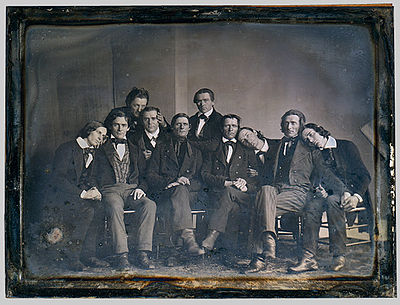 Irish melody
Rosin the Bow and is very old. Sung by the
Hutchinson family, it has been suggested that the song helped Lincoln
get elected.
Here are the lyrics: Irish melody
Rosin the Bow and is very old. Sung by the
Hutchinson family, it has been suggested that the song helped Lincoln
get elected.
Here are the lyrics:
We'll go for the son of Kentucky—
The hero of Hoosierdom through;
The pride of the Suckers so lucky—
For Lincoln and Liberty too!
Our David's good sling is unerring,
The Slaveocrats' giant he slew;
Then shout for the Freedom-preferring—
For Lincoln and Liberty too!
They'll find what, by felling and mauling,
Our rail-maker statesman can do;
For the People are everywhere calling
For Lincoln and Liberty too.
Then up with our banner so glorious,
The star-spangled red-white-and-blue,
We'll fight till our flag is victorious,
For Lincoln and Liberty too!
Come all you true friends of the nation
Attend to humanity's call
Oh aid of the slaves' liberation
And roll on the liberty ball
We'll finish the temple of freedom
And make it capacious within
That all who seek shelter may find it
Whatever the hue of their skin.
Success to the old fashioned doctrine
That men are created all free
And down with the power of the despot
Wherever his stronghold may be.
Peppy enjoyed playing
Dixie
and
The Bonnie Blue Flag
for some guests from The United
Daughters of the Confederacy. These songs spoke of the reasons why
the South left the Union. They were de facto national anthems that
gave the rebellious states motivation and identity.
Like the above song
The Bonnie Blue Flag was based on another
old Irish tune
The Irish Jaunting Car.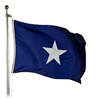
We are a band of brothers
And native to the soil,
Fighting for the property
We gained by honest toil;
And when our rights were threatened,
The cry rose near and far --
"Hurrah for the Bonnie Blue Flag
That bears a single star!"
(Chorus) Hurrah! Hurrah!
For Southern rights hurrah!
Hurrah for the Bonnie Blue Flag
That bears a single star.
As long as the Union
Was faithful to her trust,
Like friends and like brothers
Both kind were we and just;
But now, when Northern treachery
Attempts our rights to mar,
We hoist on high the Bonnie Blue Flag
That bears a single star.
(Chorus)
First gallant South Carolina
Nobly made the stand,
Then came Alabama,
Who took her by the hand.
Next quickly Mississippi,
Georgia and Florida
All raised on high the Bonnie Blue Flag
That bears a single star.
(Chorus)
Ye men of valor,
gather round
The banner of the right;
Texas and fair Louisiana
Join us in the fight.
Davis, our loved president,
And Stephens statesman are;
Now rally round the Bonnie Blue Flag
That bears a single star.
And here's to old Virginia--
The Old Dominion State--
Who with the young Confederacy
At length has linked her fate;
Impelled by her example,
Now other states prepare
To hoist on high the Bonnie Blue Flag
That bears a single star.
(Chorus)
Then cheer, boys, cheer;
Raise the joyous shout,
For Arkansas and North Carolina
Now have both gone out;
And let another rousing cheer
For Tennessee be given,
The single star of the Bonnie Blue Flag
Has grown to be eleven.
(Chorus)
Then here's to our Confederacy,
Strong are we and brave;
Like patriots of old we'll fight
Our heritage to save.
And rather than submit to shame,
To die we would prefer;
So cheer for the Bonnie Blue Flag
That bears a single star.
In a similar manner for north, the
Battle Cry of Freedom, was a song that was desired by many to be our national anthem.
Next up was
When Johnny Comes Marching Home.
This version was performed by United States Military Academy
Band. Soldiers and civilians
alike identify with the return from a long and tedious deployment.
Give Us A Flag
echoes the sentiments
of a people who were eager to participate in their liberation and
destiny. They sought to
change the minds of anyone who thought that they could not be citizens
or soldiers. Their success
paved the way for civil rights that would rightfully be instituted.
Frémont he told them when the war it first begun,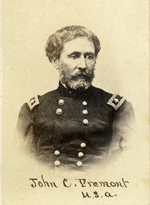
How to save the Union, and the way it should be done;
But Kentucky swore so hard and old Abe he had his fears,
Till every hope was lost but the colored volunteers.
Chorus:
Oh! give us a flag, all free without a slave,
We'll fight to defend it as our fathers did so brave:
The gallant Comp'ny "A" will make the rebels dance;
And we'll stand by the Union if we only have a chance.
McClellan went to Richmond with two hundred thousand brave:
He said, 'keep back the niggers' and the Union he would save.
Little Mac he had his way, still the Union is in tears,
Now they call for the help of the colored volunteers.
Old Jeff says he'll hang us if we dare to meet him armed:
A very big thing, but we are not at all alarmed;
For he first has got to catch us before the way is clear,
And 'that's what's the matter' with the colored volunteer.
So rally, boys, rally, let us never mind the past:
We had a hard road to travel, but our day is coming fast;
For God is for the right, and we have no need to fear:
The Union must be saved by the colored volunteer.
Then here is to the 54th, which has been nobly tried,
They were willing, they were ready, with their bayonets by their side,
Colonel Shaw led them on and he had no cause to fear,
About the courage of the colored volunteer.
The
Vacant Chair sadly tells of the loss of a family member from the Civil War. It
put into words the effect that war had on the living, the empty chair at
the dinner table a symbol of their horrible loss.
We shall meet, but we shall miss him
There will be one vacant chair
We shall linger to caress him
While we breathe our evening prayer;
When a year ago we gathered
Joy was in his mild blue eye
But a golden chord is severed
And our hopes in ruin lie
(Chorus) We shall meet, but we shall miss him
There will be one vacant chair
We shall linger to caress him
While we breathe our evening prayer
At our fireside, sad and lonely
Often will the bosom swell
At remembrance of the story
How our noble Willie sell;
How he strove to bear our banner
Through the thickest of the fight
And uphold our country's honor
In the strength of manhood's night
(Chorus)
No music program for this period
would be complete without
The Battle Hymn of the Republic.
I chose Lee Greenwood's version
because of his profound delivery of the powerful message of the words of
Julia Ward Howe. This powerful message was evident in Lincoln's
second inauguration speech that underscores his desire for " a new birth
of freedom".
Mine eyes have seen the glory of the coming of the Lord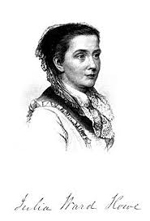
He is trampling out the vintage where the grapes of wrath are stored
He hath loosed the fateful lightning of His terrible swift sword
His truth is marching on, His truth is marching
Glory, glory, Hallelujah! Glory, glory, Hallelujah!
Glory, glory, Hallelujah! His truth is marching on
I have seen Him in the watch fires of a hundred circling
camps
They have builded Him an altar in the evening dews and damps
I can read His righteous sentence by the dim and flaring lamps
Glory, glory, Hallelujah! Glory, glory, Hallelujah!
Glory, glory, Hallelujah! His day is marching on
In the beauty of the lilies, Christ was born across the sea
With a glory in His bosom that transfigures you and me
As He died to make men holy, let us live to make men free
While God is marching on
Glory, glory, Hallelujah! Glory, glory, Hallelujah!
Glory, glory, Hallelujah! His truth is marching on!
We enjoyed watching Gerridine and
Cindy period dance to
Tenting on the Old Campground.
Peppy finished his program with the
Stephen Foster composition
Hard Times Come No More. The version that was
selected was performed by James Taylor, Mark O'Connor, Yo Yo Ma and
Edgar Meyer. These great
artists enabled us to identify with the trauma associated with war and
destruction. With the tragedy of what happened on 9/11, its
message is certainly relevant even today.
Let us pause in life's pleasures and count its many
tears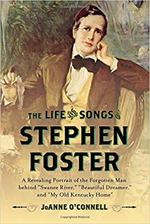
While we all sup sorrow with the poor
There's a song that will linger forever in our ears
Oh, hard times, come again no more
'Tis the song, the sigh of the weary
Hard times, hard times, come again no more
Many days you have lingered all around my cabin door
Oh, hard times, come again no more
While we seek mirth and beauty and music light and gay
There are frail forms fainting at the door
Though their voices are silent, their pleading looks will say
Oh, hard times, come again no more
'Tis the song, the sigh of the weary
Hard times, hard times, come again no more
Many days you have lingered all around my cabin door
Oh, hard times, come again no more
There's pale drooping maiden who toils her life away
With a worn out heart, whose better days are o'er
Though her voice it would be merry, 'tis sighing all the day
Oh, hard times, come again no more
'Tis the song, the sigh of the weary
Hard times, hard times, come again no more
Many days you have lingered all around my cabin door
Oh, hard times, come again no more
'Tis the song, the sigh of the weary
Hard times, hard times, come again no more
Many days you have lingered all around my cabin door
Oh, hard times, come again no more
Peppy ended his presentation with a brief description
of the life of the sad life
of Stephen Foster. I found
this biographical sketch of him on the Internet.
Stephen Collins Foster, born July 4, 1826,
Lawrenceville [now part of Pittsburgh], PA, U.S.—died Jan. 13, 1864, New
York, NY., was an American composer whose popular minstrel songs and
sentimental ballads achieved for him an honored place in the music of
the United States.
Foster grew up on the urban edge of the Western
frontier. Although formally
untutored in music, he had a natural musical bent and began to write
songs as a young boy. He
absorbed musical influences from the popular, sentimental songs sung by
his sisters, from black church services he attended with the family’s
servant Olivia Pise, from popular minstrel show songs, and from songs
sung by black laborer at the Pittsburgh warehouse where he worked for a
time.
In 1842 he published his song
Open Thy Lattice, Love. In 1846
he went to Cincinnati as a bookkeeper, returning to Pittsburgh in 1850
to marry Jane McDowell, a physician’s daughter.
In 1848 he sold his song
Oh! Susanna for $100; together with his
Old Uncle Ned it brought the publisher about $10,000.
In 1849 Foster entered into a contract with Firth, Pond & Co.,
the New York publishers to whom he had previously given the rights for
Nelly Was a Lady. He was
commissioned to write songs for Edwin P. Christy’s minstrel show.
The most famous,
Old Folks at Home (1851), also called
Swanee River, appeared originally under Christy’s name; Foster’s
name appeared on the song after 1879.
In 1852 he made his only visit to the South.
Although he stated that his ambition was to become
“the best Ethiopian [i.e., Negro minstrel] song writer,” he vacillated
between composing minstrel songs (for which he is largely remembered)
and songs in the sentimental “respectable” style then popular.
He was never a sharp entrepreneur for his talents, and in 1857,
in financial difficulties, he sold all rights to his future songs to his
publishers for about $1,900.
The profits from his songs went largely to performers and publishers.
In 1860, already struggling with sinking morale and
alcoholism, he moved to New York City.
His songs after that date are largely sentimental songs such as
Poor Drooping Maiden. His wife
left him in 1861, except for a brief reconciliation in 1862.
He spent the rest of his life in debt.
He left about 200 songs, for most of which he wrote
the words as well as the music.
They include
Camptown Races, Nelly Bly, My Old
Kentucky Home, Massa’s in de Cold, Cold Ground, Old Dog Tray, Old Black
Joe, Jeanie with the Light Brown Hair,
and
Beautiful Dreamer.
Last
changed: 07/22/2018
|

